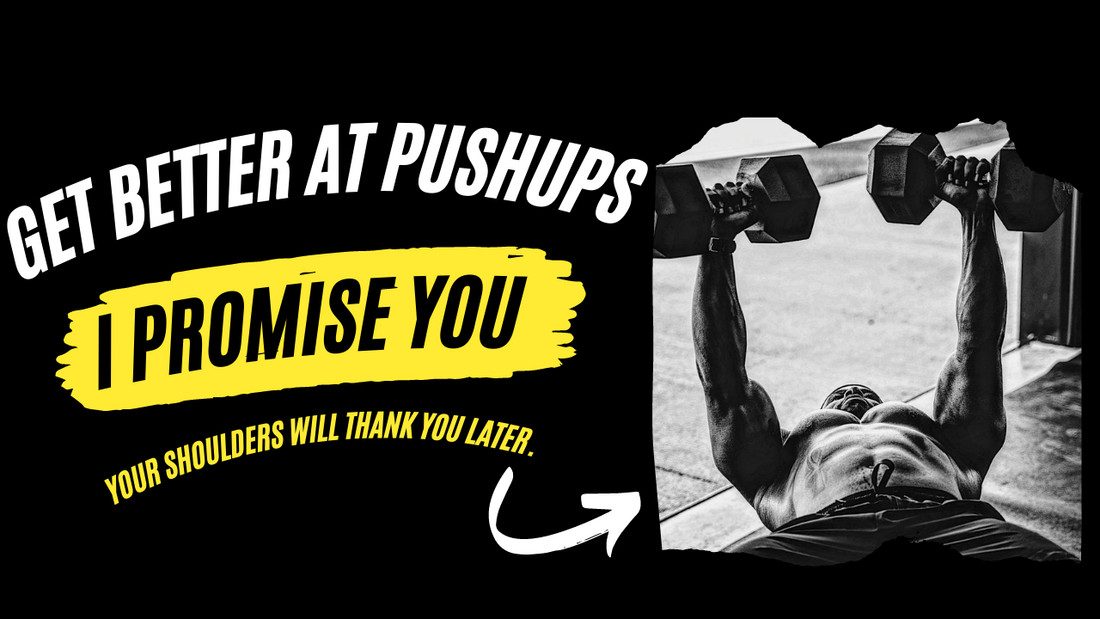Push-Up Misconception
It is often thought that a push-up is a "beginner" exercise or an exercise that should only serve as a warmup before your main press on your push day. I do agree that the push-up is a great starting point and I myself for sure will use push-ups as a way to warm up, but that is not the end of the story.
Here are my 3 reasons why you need to incorporate more push-ups and in all totality get better at them:
When performing a push-up you're essentially assuming a plank position the entire set. If done properly you're essentially preforming a dynamic plank where the core and the hips must be "stacked n' stable" in order to keep the body in a rigid line during the movement. We all know how hard planks can get just by themselves, let alone adding in additional instruction and movement which further places a greater demand on midline. This demand is further increased as you're doing weighted push-ups because any external weight that you add onto your back is is directly working against your core as you try to maintain that rigid body position and prevent your hips from sagging or your lower back from arching into extension.
Anti-extension is one of the primary functions of the core musculature - that is prevention of the spine from buckling and being pushed into a hyperextended position. Thereby, training this function concurrently with your upper body actually makes push-ups one of the most "functional" upper body strength builders to date.
The push-up is a closed chain exercise, meaning that the hands are anchored to the floor and cannot move during the exercise while the bulk of the movement takes place by moving your body through space. The opposite of this would be an open chain exercise, such as the bench press where the body is fixed while the limbs move freely.
One of the main differences between a bench press and push up is that during a bench press the shoulder blades are pinned down and retracted against the bench. This "packing" of the shoulder should prevent scapular movement during the set and therefore enhance stability with the weight over your face.
In contrast, for a push-up the shoulder blades are NOT pinned to anything and can move freely during the execution of the exercise. Allowing the scapulae to both retract and protract freely against the ribcage as you move from the bottom of the rep to the top of the rep leads to:
- Allowing the serratus anterior muscle to join in, which is nearly impossible during a bench press because the serratus anterior primarily engages when the scapula protracts.When the serratus anterior is inhibited, lengthened or weakened, scapular protraction and upward rotation are impaired. This will in-turn limit overhead range of motion and reduce overall scapular/shoulder stability, leading to an increase in the risk of injury to the rotator cuff and shoulder girdle. This in part explains why many people struggle with the overhead press because if the scapula doesn't function properly then it's not going to elevate properly during overhead pressing. This will leave you at risk for impingement at the shoulder joint leading to inflammation, pain, and possibly even tears.
- Additionally, because you can add "depth" to your push-ups this will allow for a larger trained range of motion. Whereas, when performing a bench press the rep stops when the bar touches the chest and over time that limited range of motion can cause stiffness or discomfort if pushed passed that particular point. It is much better to have trained and have control over a greater ROM than to strengthen one particular ROM for the reason that life is unpredictable and if you find your self pushing off the floor or reaching behind your self for any reason you don't want to be the guy or girl that tears a pec or strains a shoulder.
Last, but not least push-ups are an excellent and easy way to add extra volume to your upper body days. It does not take a genius to recognize that push-ups if done properly do not beat you up like the bench press does, even when you go heavy weighted on the push-up. Also, the push-up does not fry the nervous system in quite the same way as heavy or even moderately heavy bench presses do. Therefore, high volumes and high frequencies of this movement can be performed. As mentioned earlier the stimulus to fatigue ratio for this movement is great meaning you can do desirable amounts of work and recover relatively fast, where as after a 400+ bench day I am fried for at least 72 hours.
Conclusion
To summarize, push ups deserve a spot in everyones program regardless of skill level especially since this exercise can be scaled for just about anyone. If you're looking to have healthier shoulders and a more defined upper body, then you NEED TO GET BETTER AT PUSHUPS.
Lock In.

